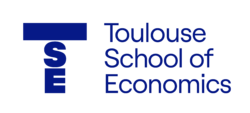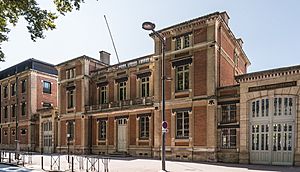Toulouse School of Economics facts for kids
 |
|
|
Other name
|
TSE |
|---|---|
| Motto | Une grande école au sein de l'université |
|
Motto in English
|
Economics for the Common Good |
| Type | Economics departement |
| Established | 2007, as an independent institution 2011, within the Toulouse 1 Capitole University |
|
Academic affiliations
|
|
| Dean | Stéphane Gregoir |
| Director | Christian Gollier |
| Location |
,
France
|
| Campus | Toulouse 1 Capitole University |
The Toulouse School of Economics (TSE) is a special school in Toulouse, France. It focuses on studying economics, which is about how people and countries make choices about money, resources, and goods. TSE is connected to the Toulouse 1 Capitole University.
TSE offers different study programs for students. These include bachelor's and master's degrees. They teach subjects like economics, data science, and statistics. Many teachers at TSE are well-known experts in economics.
Some teachers and researchers from TSE have won important awards. One famous example is Jean Tirole, who won the Nobel Memorial Prize in Economic Sciences in 2014. This prize is one of the highest honors in economics. TSE is known for its excellent research. It is often ranked among the top economics schools in Europe and the world.
Classes at TSE are taught in both French and English. The school has about 2,400 students from over 90 different countries. There are also about 150 full-time teachers. TSE researchers work with businesses and governments. They help make important decisions about how the economy works in France and other parts of the world.
Contents
History of TSE
The story of the Toulouse School of Economics began in 1981. A researcher named Jean-Jacques Laffont started a research group called GREMAQ. This group studied mathematical economics. Later, in 1990, another group called the Industrial Economics Institute (IDEI) was created.
In 1996, the "Manufacture des Tabacs" campus opened. This new place became home to the growing group of economists in Toulouse. In 2006, GREMAQ and IDEI joined together to form the Toulouse School of Economics.
A special foundation, the Jean-Jacques Laffont-TSE foundation, was set up in 2007. This foundation helps support world-class research at TSE. In 2011, TSE started offering more education programs. They also created the Institute for Advanced Study in Toulouse (IAST).
In 2012, the French government chose TSE as a "laboratory of excellence" (LABEX). This meant TSE received special funding to attract top researchers. The funding helped TSE study how incentives affect people's economic choices.
In 2014, Jean Tirole from TSE won the Nobel Prize in Economics. This brought a lot of international attention to the school. TSE continued to grow, starting new research centers. These centers focused on topics like energy, climate, and digital economics.
In 2020, TSE opened a new, modern building. They also launched new research centers on health, infrastructure, and competition policy. In 2023, TSE gained a special status called "grand établissement." This gives the school more freedom in how it operates. It can make its own choices about student admissions and research.
What Students Study at TSE
Getting into the Toulouse School of Economics is competitive. Students usually join after studying for two years at the Toulouse 1 Capitole University. About 250 students are accepted into the third year. Around 30% of these students come from other schools.
Bachelor's Degrees
TSE offers three types of bachelor's degrees. Students spend two years at Toulouse 1 Capitole University. Then they complete their final year at TSE.
- Bachelor's Degree in Economics: This program teaches students how to analyze economic situations. It also covers econometrics, which uses math and statistics to study economic data.
- Double Degree in Economics and Mathematics: This program combines economics with mathematics and computer science. It helps students use math tools to understand human behavior and economic issues.
- Double Degree in Economics and Law: This program combines economics with law. Students learn about topics like competition law and how markets are regulated.
Master's Degrees
TSE has three main paths for master's degrees:
- International Track: These programs are taught in English. They cover various topics like economics of markets, public policy, and data science.
- French Track: These programs are taught in French. They include applied economics and finance.
- Doctoral Track: This path prepares students for a PhD. It involves two years of advanced courses.
International Track Programs
- Master's degree in Economics of Markets and Organizations (EMO)
- Master's degree in Econometrics and Empirical Economics (EEE)
- Master's degree in Public Policy and Development (PPD)
- Master's degree in Statistics and Econometrics
- Master's degree in Environmental and Natural Resources Economics (ERNA)
- Master's degree in Data Science for social sciences (D3S)
- Master's degree in Mathematics and Economic Decision (MED)
- Master's degree in Economics and Ecology (EE)
- Master's degree in Economics of Global Risks (EGR)
French Track Programs
- Master's degree in Applied Economics
- Master's degrees in Finance, with Toulouse School of Management:
- Corporate Finance
- Financial Markets and Risk Evaluation
- Finance and Information Technology
- Master of Science in Finance
- Master's degree in Economics and Competition Law, with the Faculty of Law of Toulouse.
Doctoral School
The doctoral program is for students who want to earn a PhD. It starts with two years of advanced courses. After these courses, students spend two to three years writing their PhD thesis. This prepares them for jobs as researchers or professors.
How TSE is Managed
TSE is made up of three main parts. These parts work together to manage the school's teaching and research.
- The TSE Ecole d'économie et de Sciences sociales quantitatives (EESSQ-TSE) handles all the teaching programs. This includes bachelor's, master's, and PhD degrees.
- The Jean-Jacques Laffont - TSE Foundation helps guide TSE's overall plans. It also provides money and support for research. This foundation was created in 2007.
- The Unité mixte de recherche (UMR TSE-R) is a research lab. Most of TSE's researchers work here. It is overseen by TSE and other French research groups.
TSE has a Scientific Council. This group helps make important decisions for the TSE Foundation. It includes many well-known professors from universities around the world.
Notable Alumni
- Philippe Crébassa, a French public servant.
- Éloïc Peyrache, a French economist.
See also
 In Spanish: Toulouse School of Economics para niños
In Spanish: Toulouse School of Economics para niños



